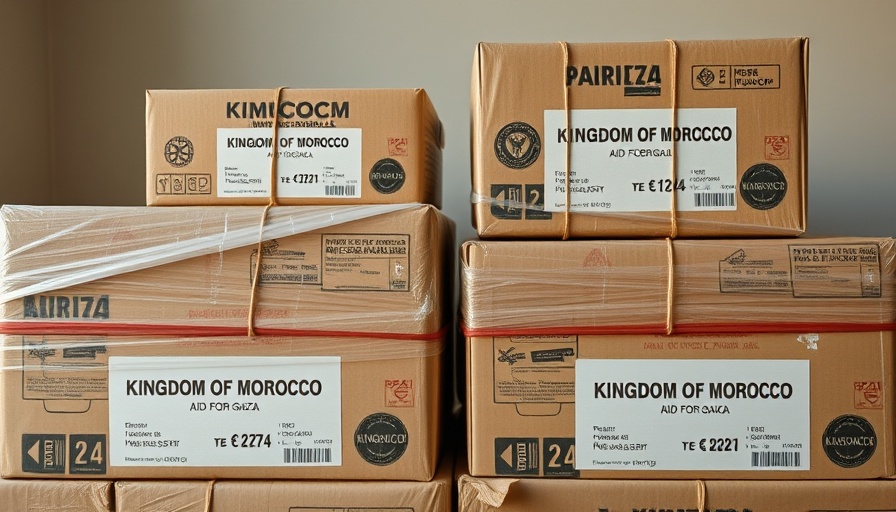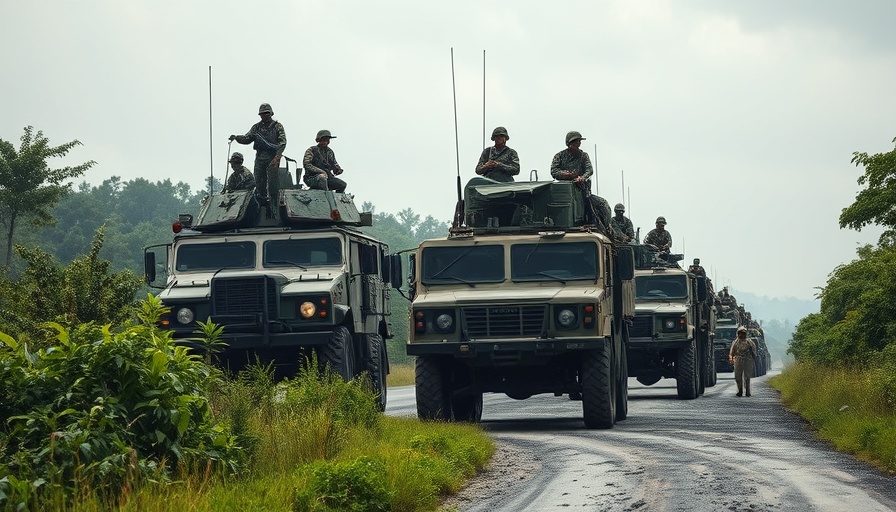
Morocco's Humanitarian Response: A Pillar of Support for Gaza
In an era marked by global humanitarian crises, Morocco's recent delivery of its third batch of humanitarian assistance to Gaza stands as a testament to the nation’s commitment to supporting those in need. Following the directive of King Mohammed VI, the shipment signifies not just a response to immediate medical and nutritional needs but also reflects a broader regional solidarity with the Palestinian people enduring severe hardships.
In 'Morocco delivers third humanitarian Aid shipment to Gaza under King's directive,' the discussion dives into the significance of Morocco's humanitarian efforts, prompting a deeper analysis of the wider implications for the region.
Contextualizing the Humanitarian Crisis in Gaza
The ongoing humanitarian crisis in Gaza has been exacerbated by political instability and conflict, leading to significant shortages in essential supplies. The persistent blockade has left many civilians in dire conditions, with limited access to vital medical care and nourishment. Just this week, Morocco's shipment included critical medical supplies and food products aimed at alleviating suffering among the civilian population, a move that highlights the critical role of international aid in conflict zones.
The Significance of King Mohammed VI's Directive
King Mohammed VI's leadership in this initiative is pivotal. As Chairman of the Al-Quds Committee, he emphasizes Morocco's longstanding solidarity with the Palestinian cause. His directives serve not only to mobilize necessary humanitarian assistance but also to enhance Morocco's image as a nation that values cooperation and charity across borders. This policy is particularly relevant in the context of Morocco's growing diplomatic presence in the region, which seeks to foster peace and cooperation.
Comparative Analysis: Regional Responses to Gaza's Needs
Morocco is not alone in its humanitarian efforts; numerous countries, including Jordan, the UAE, and France, have contributed through various means, such as airdrops. These efforts underscore a collective regional response to an escalating humanitarian crisis. However, the challenge remains: how to ensure that aid reaches those in desperate need without becoming entangled in political maneuvering or military conflicts that often dominate the narrative surrounding aid in Gaza.
Impact of Humanitarian Aid on Civilians
As articulated by local humanitarian workers, Moroccan aid has already made a significant impact on countless lives. The response from the Palestinian Red Crescent indicates a tangible need, with the organization pledging to facilitate the distribution of aid to the hardest-hit areas. This is crucial in a region governed by uncertainty, where every effort to deliver humanitarian assistance can essentially alter the course of a family’s survival amidst the prevailing turmoil.
The Broader Implications of Continued Support
By providing ongoing humanitarian assistance, Morocco is engaging in a vital form of diplomacy that extends beyond mere aid. It shapes the narrative in international forums of diplomatic and economic relations. This process encourages other nations to step up their commitments while showcasing Morocco's leadership role in Africa—especially in the context of African diplomacy and collective efforts towards resolving the Palestinian humanitarian crisis, which remains a preeminent issue within the broader sphere of African politics.
Envisioning a Future for Humanitarian Collaboration
The Moroccan initiative sets a precedent that could usher in a new era of humanitarian collaboration among African nations. Investments in infrastructure that facilitates aid delivery, while ensuring peace and security for aid workers, must evolve alongside these humanitarian missions. Additionally, fostering relationships with NGOs and the international community could amplify the effectiveness of these efforts and lead to long-term strategies advocating for peace and stability in the region.
Conclusion: Taking Action for Lasting Change
As professionals and advocates for social justice, it is imperative to recognize the significance of such humanitarian actions and their ripple effects on governance, accountability, and the collective memory of conflict. Understanding the complexities surrounding humanitarian aid, especially in contexts like Gaza, not only informs our perspectives but also inspires us to take informed actions as global citizens. We must engage in dialogue and participate in initiatives that not only seek to provide immediate relief but also advocate for sustainable solutions to complex crises.
 Add Row
Add Row  Add
Add 




Write A Comment